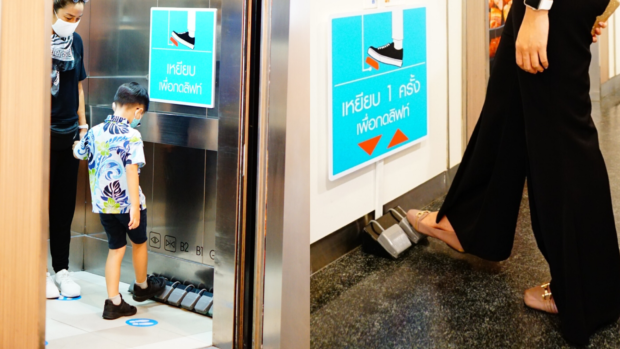
Customers use foot pedals in an elevator in Seacon Square mall in Bangkok, Thailand. Images: Twitter/@seaconsquare
A mall in Bangkok, Thailand, has installed foot pedals in place of the usual elevator buttons amid the spread of the coronavirus.
Seacon Square posted photos of its new precaution against the coronavirus on Twitter last Wednesday, May 20. The establishment also showed some of its customers wearing face masks as they used the foot pedals to operate an elevator.
ง่ายๆ ไร้กังวล!
กับลิฟท์เท้าเหยียบ
ที่ "ซีคอนสแควร์ ศรีนครินทร์"
ง่ายๆ เพียงใช้เท้าเหยียบ 1 ครั้งที่หน้าลิฟท์
เพื่อเลือกขึ้น หรือลง
จากนั้น เมื่อเข้าลิฟท์ เหยียบเลือกชั้นที่ต้องการไปได้เลยสะดวก ปลอดภัย ไม่ต้องใช้มือสัมผัส ! pic.twitter.com/IAddfeIO7K
— Seacon Square (@seaconsquare) May 20, 2020
Along with the new pedals, the mall continues to follow other measures such as having their staff wear masks and gloves while they check the temperature of customers entering the building. The employees also spray shoppers’ hands with alcohol before they are allowed inside, as seen on its Instagram page on May 6.
Thailand started easing lockdown measures on May 3, allowing establishments such as shopping centers, restaurants and hair salons to reopen nationwide. However, details on reopening vary per province.
Meanwhile, Thai scientists have also begun working on a coronavirus vaccine. They first tested it on macaque monkeys, hoping it will be ready by 2021. The country now joins various countries across the globe that are trying to produce a vaccine for the virus.
The World Health Organization notes that over 100 candidate vaccines are already in different stages of development, with at least eight of them in clinical trials with humans.
If Thailand’s tests on the monkeys are successful, Thai scientists aim to start human trials in October.
Dr. Suchinda Malaivitjitnond, director of the National Primate Research Center of Thailand, who oversaw the initial testing on the monkeys, hopes that a Thailand-made vaccine will be cheaper than those created in Western countries. /ra
RELATED STORIES:
6-month-old baby with heart and lung problems beats COVID-19
Suicide rate in Japan declines amid COVID-19 lockdown